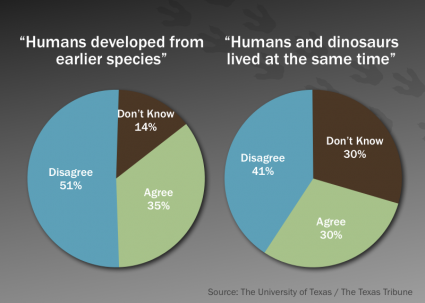Future Now
The IFTF Blog
The Flintstones and the Epistemological Rapture
A recent survey by the University of Texas/Texas Tribune showed that 30% of Texans believed that humans and dinosaurs lived together at the same time--and not over 60 million years apart as all our current science indicates.

The participants who thought humans and dinosaurs inhabited the Earth together tended to be evangelical in beliefs and Republican in politics. This segment of society holds enormous power within the structures of government and in influencing policy. There are other large segments of our population who not only hold different beliefs from each other, but have an entirely different notion of HOW we believe and what counts as truth. How does one persuade large numbers of people toward a common goal when you can't even agree on some of the most fundamental ground-rules about how the world works?
Epistemology is the branch of philosophy concerned with HOW we know what we know. It provides perspective on the conditions that make certain thoughts thinkable, certain questions askable, and certain answers acceptable. Gaston Bachelard, a French philosopher of science, developed the concept of epistemological ruptures--events or discoveries that change the whole approach to a set of scientific questions. This rupture is related to Thomas Kuhn's notion of 'paradigm shift' or maybe, stretching a little, to the economic idea of creative destruction. It is a tearing down of our previously held assumptions about nature and nature's laws in order that new ideas and discoveries may flourish.
Persuasion is closely linked to and dependent on the epistemological stance of a person or population. Persuasive strategies must take into account the belief system of the target of persuasion and can either accept that belief system and work within its confines, or try and rupture it and create a whole new way to approach an issue. If we take the human/dinosaur example, we could approach the attempt to persuade the co-habitation believers by 1. taking quotes from the Pope or other religious leaders, and passages directly from scripture that refute or undermine the notion, or 2. trying to convince the believer of the falsity of all faith-based explanations of worldly events, and install a secular/scientific point of view.
I'm sure it is rather obvious that the second approach is much more transformational, more risky, and much less successful than the first. The history of politics offers very few examples of major shifts in epistemologies. The shift from divine Monarchies to a social contract that bases government on the consent of the people would be one of those rare examples.
But without these major epistemological ruptures we remain powerless to come up with new answers to looming challenges because too many of us are asking the wrong questions, or we literally can't see the 'real' issue in order to find new solutions. There is a sense that we are heading toward a new set of political ruptures as we fail time and time again to adequately address climate change, as global poverty and inequity increase, as energy crisis looms, and as we create new technologies that we might not be able to control.
Where will the new ruptures come from? Will we begin to re-think capitalism or warm to the notion of global governance? Who will finally be able to convince enough people that a new model is necessary? A world leader, a religious leader, a rock star? And which will come first, an epistemological rupture or an evangelical rapture? I guess it depends on who you ask. Just don't ask Fred Flintstone.



